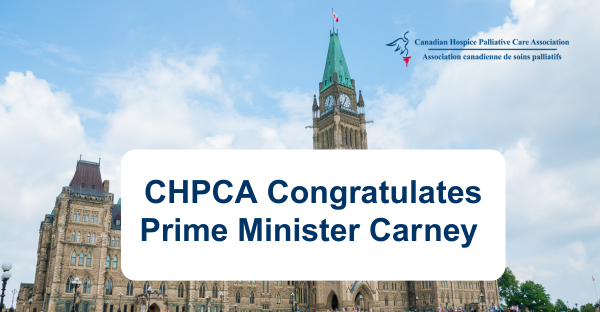CHPCA Congratulates Prime Minister Mark Carney on Election Victory
May 9, 2025

April 30, 2025
The Right Honourable Mark Carney, P.C., M.P.
Prime Minister of Canada
House of Commons
Ottawa, Ontario
K1A 0A6
Dear Prime Minister Carney,
On behalf of the Canadian Hospice Palliative Care Association (CHPCA), please accept our sincere congratulations on your election victory and your continued leadership as Prime Minister of Canada. Your leadership comes at a pivotal time, and we wish you success in the years ahead.
CHPCA is the national voice for hospice palliative care in Canada. Our vision is that everyone in Canada has equitable access to quality hospice palliative care. Through national leadership, awareness-raising, education, and policy engagement, we work with partners across the country to advance a future where all Canadians can live, grieve, and die with dignity and support.
We urge your government to recognize hospice palliative care as a healthcare priority and to move forward on full implementation of the Framework on Palliative Care in Canada through appropriate legislation, so that no Canadian is left without care because of where they live or who they are, guided by national standards and quality indicators, supported by sustainable funding.
As highlighted in our open letter during the 2025 election campaign, Canadians are calling for a healthcare system that reflects compassion, dignity, and support at every stage of life. Hospice palliative care is a proven, person-centred approach that improves quality of life and reduces strain on the healthcare system. However, in its current state, access to hospice palliative care remains a postcode lottery. Too many Canadians lack consistent and timely access to these essential services. Nearly three in five Canadians who died in 2021–2022 received palliative care, meaning two in five did not. Among those who did, almost half received it within just 22 days of death, too late to realize its full benefits. Additionally, we still lack the infrastructure to assess the quality of care people receive.
With the formation of this new Parliament, there is a timely opportunity to move forward with the implementation of the Framework on Palliative Care in Canada and to recognize hospice palliative care as a fundamental right for all Canadians.
We also encourage your government to support:
- Early, community-based palliative and end-of-life supports that meet people where they are;
- Targeted investments in caregiver services, including respite services and bereavement supports;
- Equitable, consistent, culturally safer care that is not determined by diagnosis, geography, or income;
- Continued public education and planning tools through initiatives such as Advance Care Planning Canada;
- And a national system of standards and indicators that reflect the quality and accessibility of care.
There is also a compelling economic argument. Evidence shows that early, integrated hospice palliative care leads to better outcomes for patients and families, while also delivering substantial system savings. Inpatient palliative care programs have been shown to reduce hospital costs by $7,000 to $8,000 per patient. Studies show that shifting even a modest percentage of end-of-life patients from acute care to home-based or residential palliative care can yield millions in system-wide savings.
Hospice residences offer a compassionate, cost-effective alternative to hospital-based care at the end of life. For patients unable to return home for care, shifting their care from an acute care setting (approximately $1,000/day) to a hospice residence (approximately $400/day) is one of the key mechanisms reported to reduce direct costs of care. Yet access to these services remains deeply uneven, dependent too often on where a person lives, rather than what they need.
Families also bear a significant share of the costs associated with end-of-life care. Research has shown that for patients receiving home-based palliative care, over two-thirds of total monthly costs, approximately $17,453, are attributed to caregiver time and lost wages. In addition to this unpaid labour, families face out-of-pocket expenses averaging nearly $700 per month. These financial pressures compound the emotional and physical toll of caregiving and highlight the need for a more coordinated and supported palliative care system.
Investing in hospice palliative care services, including hospice residences, is a practical strategy that supports patients, families, and the broader healthcare system. It keeps care in the community, where people want to receive it, and allows us to use our financial and health human resources more effectively. This investment also reflects values widely recognized across the health sector, such as improving health equity, supporting aging with dignity, strengthening community-based care, and acknowledging the vital role of Canada’s specialized volunteer workforce. By investing in hospice palliative care—including hospice residences—you can support patients and families while building a more compassionate, efficient, and equitable healthcare system for all Canadians.
As a national convener of provincial partners, CHPCA is well-positioned to support the rollout of national standards and facilitate implementation in every jurisdiction. We would welcome the opportunity to work with you and your staff to discuss how we can support your government’s goals and work together towards meaningful change.
Once again, congratulations on your election. We look forward to engaging further and would welcome the opportunity to meet at an early opportunity.
Sincerely,
Karine Diedrich & Cheryl Spencer
Acting Co-CEOs
Canadian Hospice Palliative Care Association (CHPCA) www.chpca.ca

